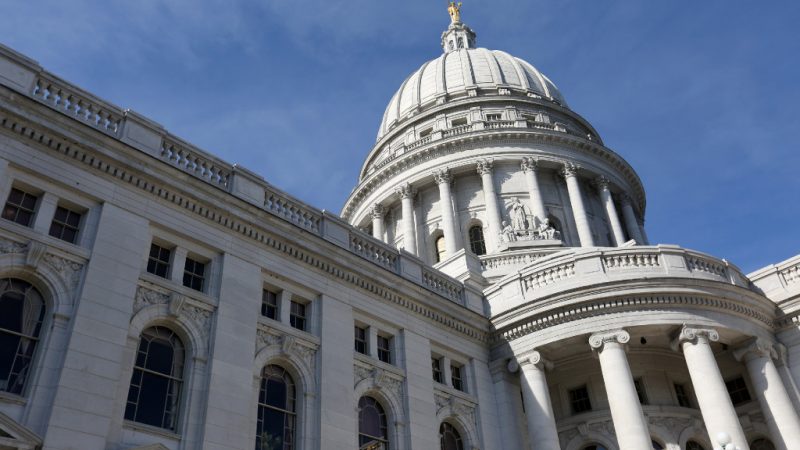Wisconsin voters have net-positive views of the way President Biden and Gov. Tony Evers are doing their jobs even as they lack confidence in how government is working, a new Marquette University Law School poll finds.
Meanwhile, U.S. Sen. Ron Johnson’s favorable rating took a dip from October.
The poll, the first the law school has released this year, found not much had changed for Biden or Evers since the final survey before the 2020 election.
Forty-nine percent of registered voters surveyed approved of the job Biden is doing, while 46 percent disapproved. That mirrors the 49-46 split for his favorable-unfavorable rating in October with registered voters.
>> WisPolitics is now on the State Affairs network. Get custom keyword notifications, bill tracking and all WisPolitics content. Get the app or access via desktop.
Meanwhile, 50 percent approved of the job Evers is doing, while 43 percent disapproved. That matches the guv’s October numbers.
But 38 percent said Wisconsin is headed in the right direction, while 51 percent said it is on the wrong track. Sixty-one percent in the March 2020 poll said the state was headed in the right direction, though Poll Director Charles Franklin noted that was unusually high. It was 46 percent in January and 52 percent in February last year.
More striking, Franklin said, was the negative view Wisconsin voters have of state and federal government.
Thirty-two percent said the state government was working as intended, while 60 percent said it was broken. For the federal government, just 10 percent said it was working, while 84 percent said it was broken.
The unhappiness with how government works stretched across party lines. For state government, 67 percent of Republicans, 60 percent of Dems and 54 percent of independents said it was broken. For the federal government, it was 91 percent of Republicans, 83 percent of independents and 79 percent of Dems.
“That is a very depressing number,” Franklin said. “Wisconsin is depressing enough, but Washington is far worse for what it says about our confidence in our government, our confidence in the way leadership in the Congress and the presidency are handling the business of our government.”
Johnson, R-Oshkosh, was viewed favorably by 35 percent of voters and unfavorably by 42 percent. He hasn’t said whether he will seek a third term next year.
It was tied for Johnson’s second-worst net favorable rating since the poll began asking voters about him. His worst was a 27-38 split in late 2015.
It’s also down from a 38-36 split in October.
Meanwhile, 40 percent of respondents had a favorable view of U.S. Sen. Tammy Baldwin, D-Madison, and 39 percent had an unfavorable one. In October, her split was 44-36.
The poll of 807 registered voters was conducted by landline and cell phone Aug. 3-8. The margin of error was plus or minus 3.8 percentage points.
The partisan makeup of the sample was 30 percent Republicans, 29 percent Democrats and 40 percent independents. Since January 2019, the partisan split has been 29 percent Republicans, 28 percent Democrats and 41 percent independents.
The poll split some policy questions so they were asked of only half the sample. On those questions, the margin of error was plus or minus 5.4 percentage points.
For example, half were asked about the accuracy of the counting of the results of the 2020 election in Wisconsin and the other half were asked about the vote tally nationally.
Sixty percent overall said they were very or somewhat confident in the national count accurately reflecting the votes cast, while 38 percent said they were not very or not at all confident.
Meanwhile, 67 percent said they were very or somewhat confident in the tally of Wisconsin’s votes, while 31 percent said they were not very or not at all.
Those results include just 22 percent of Republicans confident in the 2020 results nationally and 29 percent in the count of Wisconsin’s votes.
On other issues:
*43 percent said the rules for voting make it too difficult to cast a ballot, while 46 percent said they’re not strict enough.
*53 percent support the infrastructure package that passed the U.S. Senate this week, while 37 percent were opposed.
*46 percent say crime is higher in their community than a year ago, while 22 percent said it’s lower. Meanwhile, 69 percent say crime is higher nationally, while 10 percent said it has declined.
*49 percent were very concerned about inflation, 36 percent somewhat concerned, 12 percent not too concerned and 3 percent not at all.
*51 percent supported increasing the minimum wage to $15 an hour, while 44 percent were opposed.
*27 percent said the additional federal unemployment benefits of $300 a week was still needed, while 67 percent said it is discouraging people from returning to work.
*43 percent said they don’t know enough about proposals to ban teaching of critical race theory in public schools, while 26 percent favor teaching it and 30 percent were opposed.
See the full results here.


